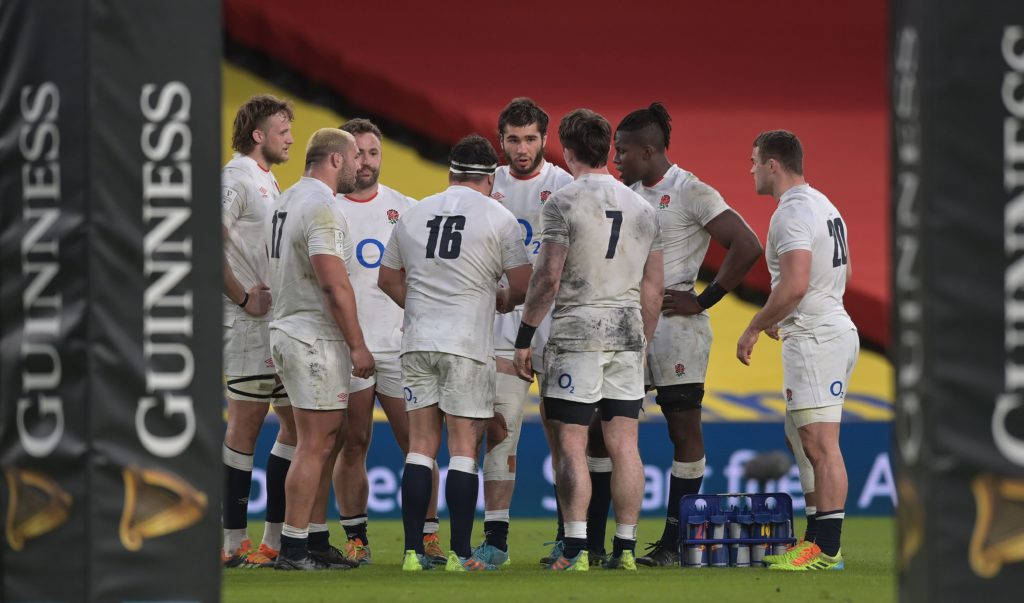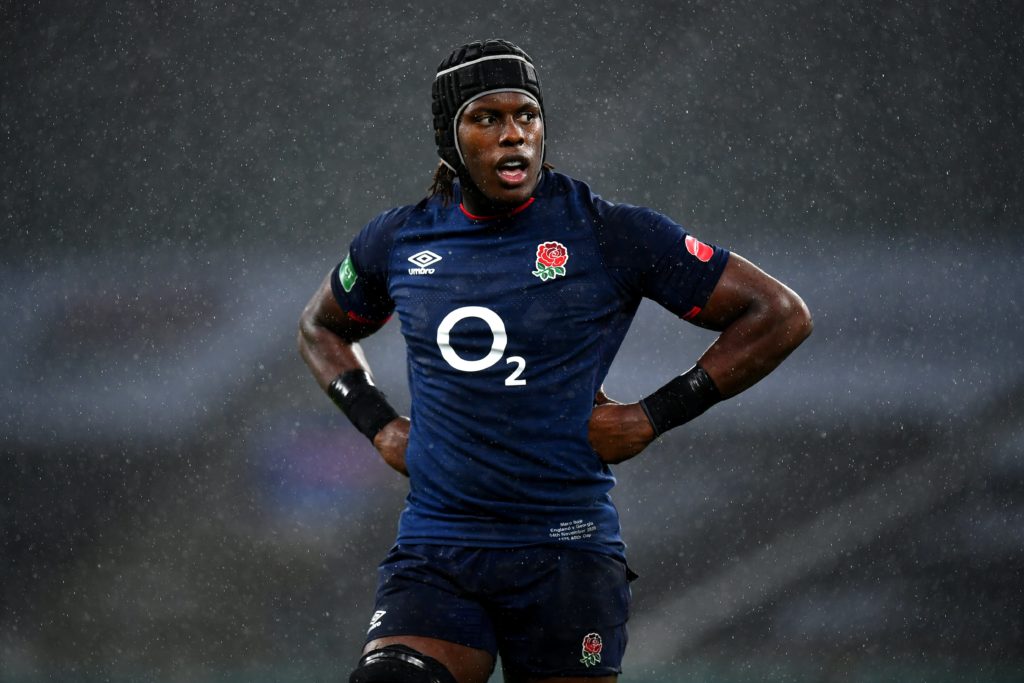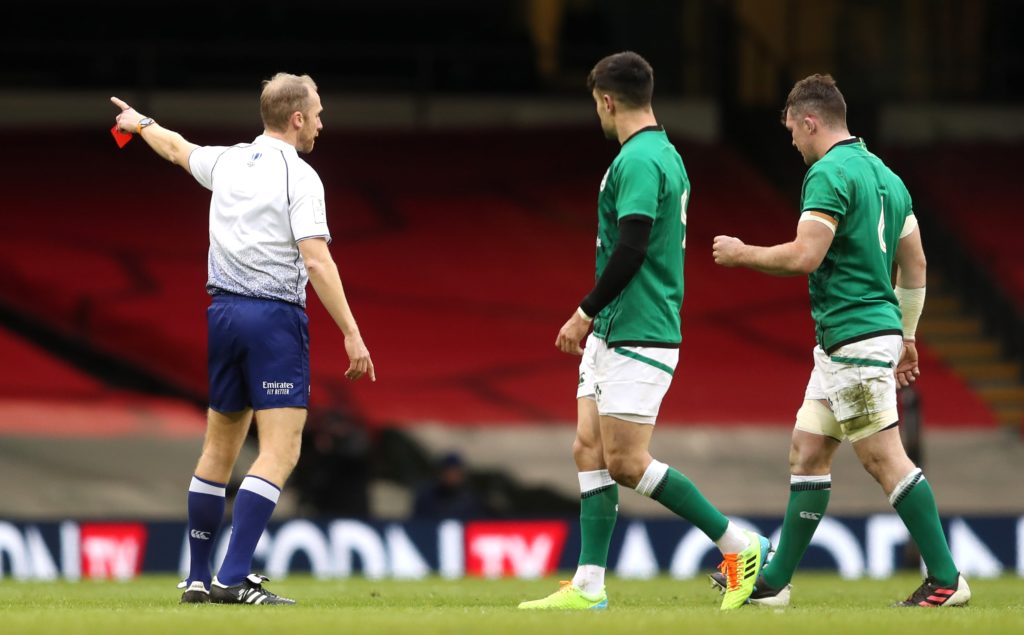Three questions for you, if you’ve a moment. (A) Would you park your car on a double-yellow line if there was a traffic warden two feet away leaning on a lamppost? (B) Would you pinch a tin of pilchards from Aldi if the aisle was being patrolled by a police officer and two special constables, each in uniform and in plain view? (C) Would you slot someone in the mush in the middle of a crowded bar if you were surrounded by 21 high-definition CCTV cameras and four AAA-LUX AL Series LED floodlights? Hopefully, you wouldn’t, unless of course you’re (A) Filthy rich and bolshie (B) A hopeless kleptomaniac or (C) Cursed with a short fuse and befuddled by five pints of heavy. And, even then, you might think twice.
Yet, in rugby terms, players do the equivalent of all of the above – (A) and (B) rather more than (C) – on a weekly basis; collectively, about 20 times a match or once every four minutes. And these are professionals. They’re drilled on the lawbook, they’ll presumably have spotted the Team Referee in the tunnel before the kick-off and, hopefully, they realise that four, ageing dudes standing pitchside with microphones, bad breath and ugly shoes means the game’s going to be on the box and, therefore, scrutinised by a TMO and a Citing Officer. And yet – still – they gatecrash rucks via the tradesman’s entrance, barge each other out of lineouts and trample all over the offside line. Go figure.
“We need to remember they’re in the heat of a battle,” says Edinburgh head coach Richard Cockerill. “There’s the haze of fatigue, maybe a bit of red mist and sometimes you make an error because you’re just not quite in control of your emotions.”
Players know the laws and they know if they’re in an illegal position… Hands in the ruck, not rolling away, offside in front of the kicker; suddenly you’re on your goal-line for 10 minutes.
Richard Cockerill
Ospreys head coach Toby Booth agrees: “There’s an optimal state of arousal, so if you’re under, then you force it a bit more because you know you’re off it, and if you’re over, you’re not in the blue but in the red and you’re probably making poor decisions.”
But, let’s be honest, some are just trying to pull a fast one. “Look, players know the laws and they know if they’re in an illegal position,” says Cockerill. “They’re just trying it on, aren’t they? Hands in the ruck, not rolling away, offside in front of the kicker; just those shitty penalties that someone gives away and suddenly you’re on your goal-line for 10 minutes and under pressure. Those players will find themselves out of the team very quickly.”
And, no question, it’s these penalties – be they ‘soft’, ‘cheap’ or ‘shitty’ – which kill more coaches than bad whiskey. “Offside, not listening to the referee, taking people out in the air and reckless tackles,’ says Booth when invited to itemise what makes him chew his clipboard. “They’re all controllable. That and back-to-back penalties – we call them compound errors – which gives the opposition 70metres without having to make a pass.”
Statistically, and not surprisingly, defensive offences comfortably outnumber attacking ones (the pressure/penalty ratio) and forwards give away far more than backs, indeed a staggering – and perhaps telling – 80 per cent of England’s penalties during the Six Nations came from the pack; 13 from the back row, 18 from the second row and 23 from the front row. For misunderstood props, of course, scrum penalties are simply an occupational hazard. Let’s not even go there.

But however, wherever and from whomever the penalties come, discipline is a complex dynamic for both coaches and players. “Look, it’s naïve to think there are never going to be penalties,” says Harlequins coach Nick Evans. “Guys on both sides of the ball are playing right on the edge but that’s where we want them to be. The big thing for us is when and where we give them away and whether it’s a persistent theme for an individual, or a unit or the team. Right now, 70 per cent of our attacking breakdown penalties come in the final quarter. So, we’re looking at that and thinking, ‘Is this a fatigue issue? Is it because the pressure’s on and the guys are on the edge? Or is the bench not quite up to the speed of the game or looking to impress or trying to make things happen?’”
Harlequins label the cheap offences as ‘red’ penalties and post lists of crimes and criminals on the players’ WhatsApp group. “Obviously, there’s coaching guidance but there’s peer accountability too,” says Evans.
At the Ospreys, they draw a clear distinction between ‘competitive’ and ‘unnecessary’ offences, while at Edinburgh – under The Candid Mister Cockerill – there are plain dumb penalties and the rest. “Penalties definitely swing the momentum of games,” he says. “But it’s a really fine balance because you want the players to be super committed and hard to play against but in the modern game, penalties are becoming hugely important. If you’re plus-10, giving away 12 or 15, you’re probably losing the match.”
Booth adds: “Discipline now is one of the fundamentals of your game; set-piece, defence and penalty count. Teams would have to be extremely good to beat you if your penalty count is below 10; or else you’d have to be really poor. But then, and this will sound ironic, you can give away too few penalties. You can be too passive as well.”
Down the phone line in darkest Surrey, you can almost hear Evans nodding his head. “Ball pressure,” he says. “If we’re not giving away any defensive penalties [from applying ball pressure] then we haven’t really slowed them down and we’re probably conceding 30 or 40 points. There’s a give and take here.”
Allied to that – and equally heretical – it’s sometimes your most effective, influential and totemic players who are higher up the whistle count. According to the 2021 Six Nations’ statistics, Tom Curry (6), Charles Ollivon (6), Maro Itoje (12) and Alun-Wyn Jones (6) were all above average; indeed, no Irishman was whistled more often than Tadhg Beirne (7). Yet, by a street, the brilliant Beirne snaffled way more turnovers (10) than anyone else in the tournament, stole two lineouts, was Ireland’s joint top try-scorer and was twice player of the match; in other words, competitive versus counter-productive is a much greyer area than it may first appear.
From the Maro point of view, you could say the count’s too high and he needs to adapt but, if you want them making turnovers and creating ball pressure, naturally there’s going to be a higher penalty count.
Nick Evans
“You look at that group,” says Evans, “and they’re all very talented, have good game sense and they’re in positions to affect the play, more probably from the defensive side of things in terms of getting over the ball. From the Maro point of view, you could say the count’s too high and he needs to adapt but, if you want them making turnovers and creating ball pressure, naturally there’s going to be a higher penalty count. For us, that would be Will Evans. Will’s our chief ball-stealer so we accept that he’s probably going to give away more penalties than anyone else on the team and you’ve got to take that with a pinch of salt.”
And while we’re talking mitigation, a penalty – or, more accurately, risking a penalty – can be a contextual necessity. “I don’t think there’s ever a ‘good’ time to give one away but it can be worth trying to break up the opposition’s momentum,” says Booth. “So, if you’re on the back foot in the scrum, sometimes it’s worth going in early to try to change the perception. It’s about situation and context, although in my experience, there’s probably very few occasions when you’d do that.”

But desperate situations sometimes demand desperate remedies. “You’d always be thinking on your goal-line, let’s give them three and not seven,” says Cockerill. “We’ve all heard it and seen it. You’d rather get penalised than let them score because the ref’s unlikely to go under the sticks first time; you know, it will be once, then twice, then a warning, maybe another warning and you’re five times into ‘cheating’ before you get the consequence. Or the ref might get a call wrong and you get a cheap turnover.”
Clearly, knowing and playing the referee is a key component to managing your penalty count; indeed, if the best way to avoid a parking ticket is a time-and-motion study on the traffic warden, it’s much the same in rugby. “We’ll have a broad outline,” says Cockerill. “It’s just being better informed and going in saying, ‘Right, this referee likes a contest at the breakdown, so we can go two or three into the tackle and make it a shit-fight because the referee will let it happen’.”
Part of it is working out what the referee’s issues are… they’re the penalties we’re trying to stay away from if he’s looking to tick that box. It’s a red flag and that’s part of just being smart.
Toby Booth
But however much homework you do, there’s no substitute for ‘reading the room’ once the game’s underway. “Part of it is working out what the referee’s issues are,” says Booth. “So, often, the question you ask is, ‘Have you anything for us, sir?’ in other words, ‘What are you looking at?’ because they’re the penalties we’re trying to stay away from if he’s looking to tick that box. It’s a red flag and that’s part of just being smart. The real skill is how players adapt to the referee. If they’ve given one away, they work out what he’s looking for and they adjust. They don’t back it up.”
And while there’s no suggestion that coaches tailor the game plan simply to avoid penalties, teams’ ability to convert opportunities from 5m-10m out clearly influences territorial thinking. “In your half, and this is from the point of view of our attack drivers, we talk about managing that middle of the field,” says Evans. “We call it ‘Middle Earth’ and it’s how we don’t get stuck in and around there playing five or six phases, the inevitability being that we’re going to have somebody out of position and get turned over.”
No question, losing the plot in ‘Middle Earth’ – understandably – traumatises many coaches. “You’re giving penalties away in the middle of the field and suddenly you’re camped on your own line,” says Cockerill. “Teams – what, 50 per cent of the time – are converting those opportunities into points. And the bigger the game and the tighter the margins, it’s those errors that let teams into your third of the field and give them opportunities that kill you.”

And if all of the above is true of penalties, it’s doubly true of sin-bins. “One hundred per cent, mate, massive killer,” says Evans.
“You can deal with it,” adds Booth, ‘but what you can’t deal with is two of them. We had two off at the same time against Newcastle Falcons in the European quarter-final: it cost us 21 points and we lost the game by four. You can’t recover from doubling up. It’s that compound error thing.”
And while most teams have well-rehearsed strategies for coping with a player on the naughty step, it does depend on which one cops the card. “A scrum-half sin-bin is an absolute nightmare,” says Booth.
“Yeah, No9 and probably your lineout caller because it’s such an important part of the game,” says Cockerill. “You’re getting probably 35-40 per cent of your possession from lineouts, so that’s always a difficult one to manage.”
Discipline has always been key but, arguably, rarely more so than now. “These days it’s a combative, invasion game which is very hard because the margins for influencing it aren’t as great anymore,” says Booth. “So opportune moments are few and far between – you’ve either got to create the confusion or create the opportunity – and as the stakes go up, you need a greater degree of self-control.
“Can you deliver that high-quality performance – in this case consistently not giving away penalties – and trust the team to find the answers rather than go looking for them yourself? That’s what separates the elite and that’s ultimately what the test is.”
More stories from Graham Simmons
If you’ve enjoyed this article, please share it with friends or on social media. We rely solely on new subscribers to fund high-quality journalism and appreciate you sharing this so we can continue to grow, produce more quality content and support our writers.



Comments
Join free and tell us what you really think!
Sign up for free